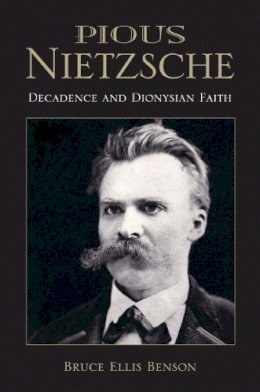
Pious Nietzsche: Decadence and Dionysian Faith
Bruce Ellis Benson
Bruce Ellis Benson puts forward the surprising idea that Nietzsche was never a godless nihilist, but was instead deeply religious. But how does Nietzsche affirm life and faith in the midst of decadence and decay? Benson looks carefully at Nietzsche's life history and views of three decadents, Socrates, Wagner, and Paul, to come to grips with his pietistic turn. Key to this understanding is Benson's interpretation of the powerful effect that Nietzsche thinks music has on the human spirit. Benson claims that Nietzsche's improvisations at the piano were emblematic of the Dionysian or frenzied, ecstatic state he sought, but was ultimately unable to achieve, before he descended into madness. For its insights into questions of faith, decadence, and transcendence, this book is an important contribution to Nietzsche studies, philosophy, and religion.
Product Details
About Bruce Ellis Benson
Reviews for Pious Nietzsche: Decadence and Dionysian Faith
Myles Werntz
Baylor University
[T]his is a rewarding study. . . . Karl Jaspers observed that 'in the end one cannot help but ask how a man who is by no means representative can still become as overwhelmingly significant as though he spoke for humanity itself.' . . . this remark puts us on the trail of answering the question of why our discovery of a pious Nietzsche might matter. . . . Bruce Benson will prove to be a helpful guide along that trail.Nov./Dec. 2009
Stephen N. Williams
Union Theological College, Belfast
In sum: Nietzsche sought to know, follow, pray to Dionysus, god of Life, through a musical ask sis, and, in doing so, he transplanted a form of Pietism onto the soil of Dionysus or, better, cultivated the apparently alien form of Dionysus on the soil of native Pietism. He may not have succeeded in overcoming his childhood Pietism. But it is what Nietzsche was about, even if he did not fully know it.11/22/09
Stephen Williams
Atlantic - Andrew Sullivan blog
I think it is not overstating the facts to say that Pious Nietzsche is the best and most important book on Nietzsche to appear in the last few years. . . . It is . . . an engaging and provocative examination of Nietzsche's religious life, rich with insight . . . .No.8 Dec. 2009
David L. O'Hara
Sino-Christian Studies
